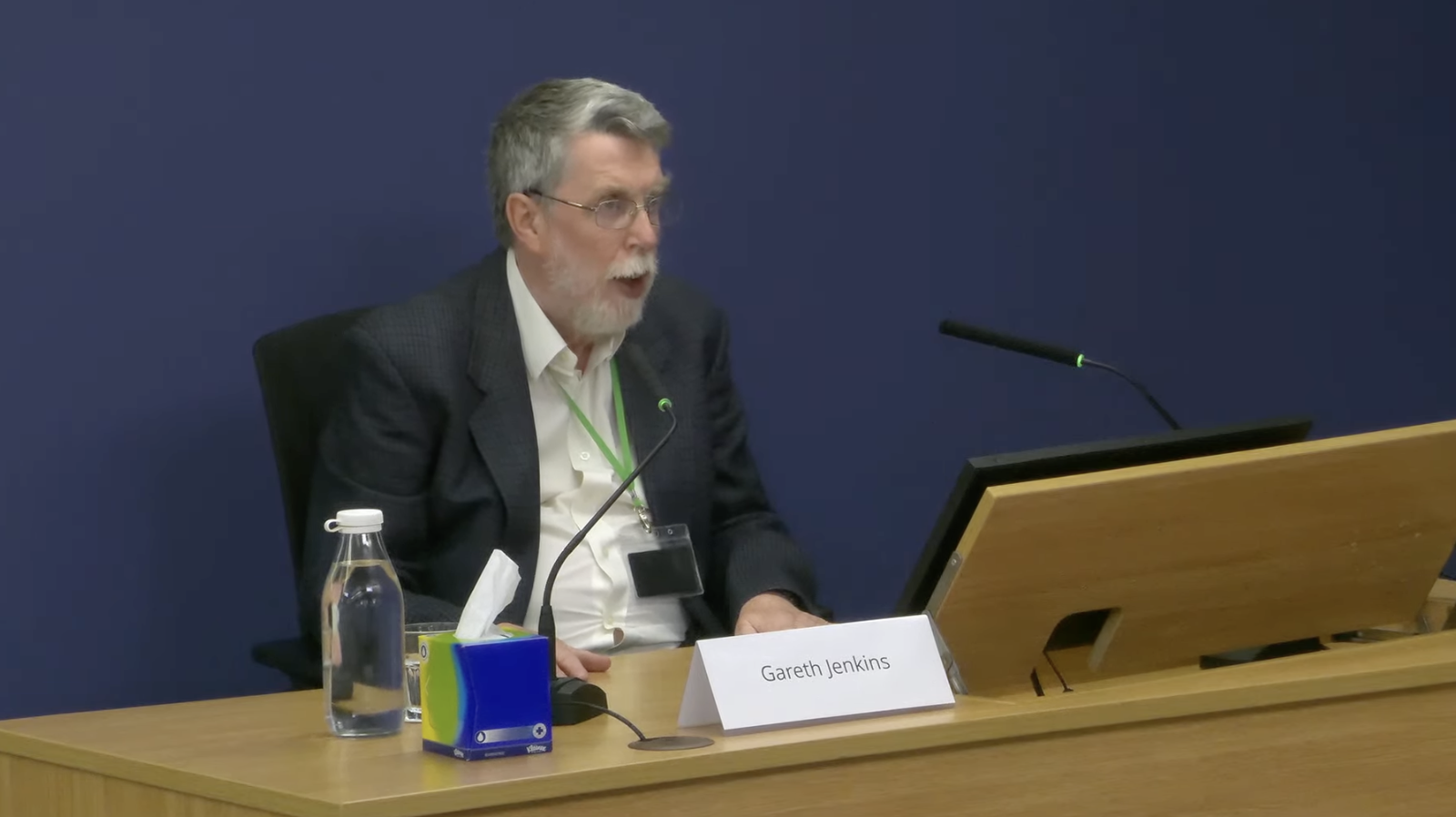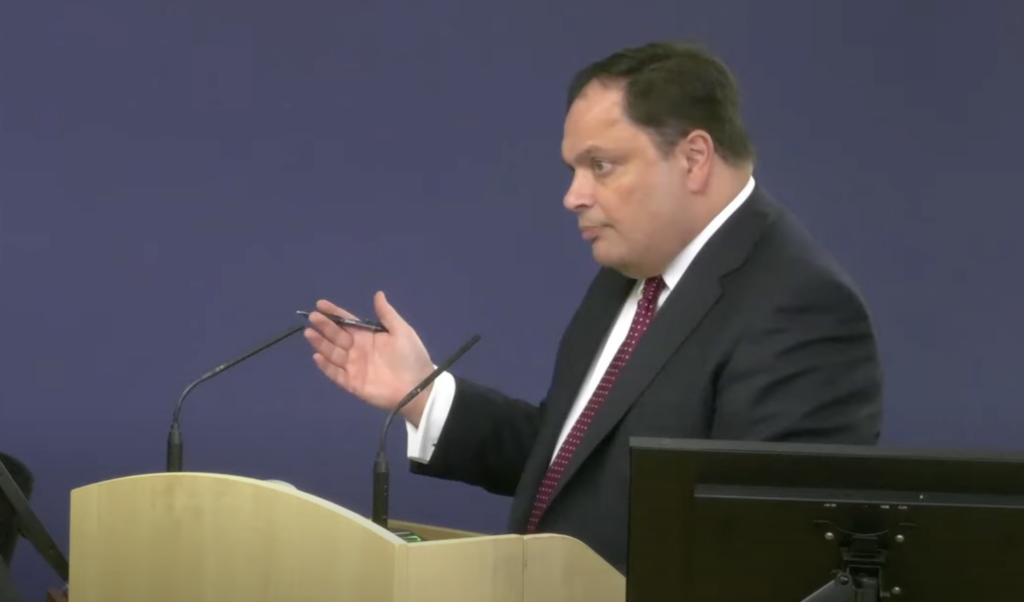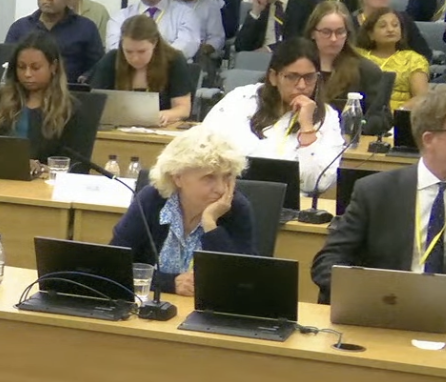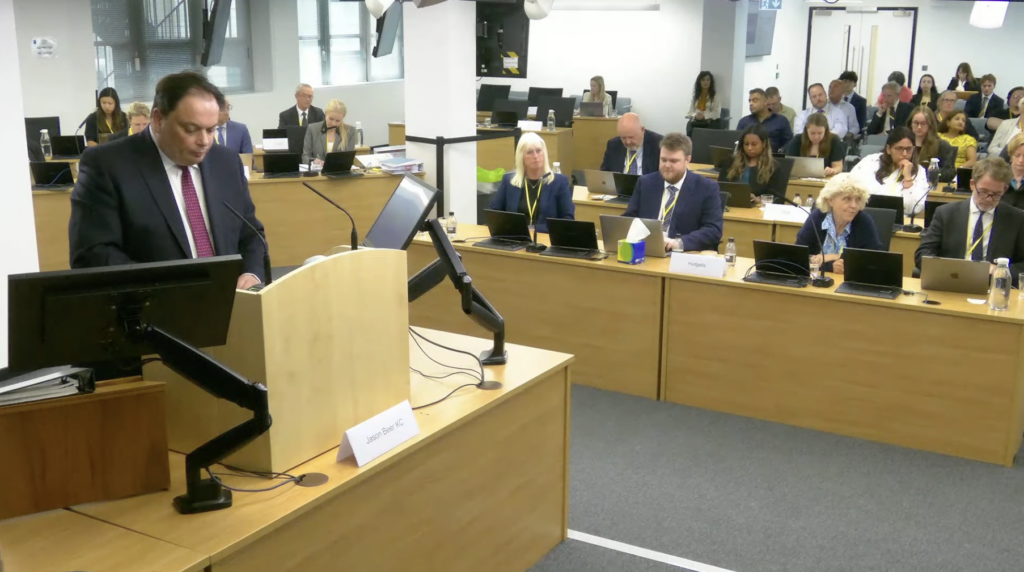
Being involved in the criminal prosecution of anyone should focus the mind. There is a lot at stake for the individual concerned. Basic human courtesy demands you take whatever task you have or are given very seriously.
Today Gareth Jenkins’ almost Olympian levels of disengagement with his wide-ranging role in helping the Post Office prosecute Subpostmasters was laid bare at the Post Office Horizon IT Inquiry.
For most of the day, Jason Beer KC focused on Jenkins’ involvement in the prosecution of Seema Misra. Seema, as many people reading this will know, was convicted of theft in October 2010, partly on the strength of Jenkins’ “expert” evidence.
Beer took him to a witness statement Jenkins produced ahead of Misra’s trial. In it he had written:
“I understand there’s a suggestion that the equipment in the branch might be faulty. I am not aware of any fundamental issues.” Jenkins points out that the main work on this has been done by his Fujitsu colleague Andy Dunks and then quotes Dunks’ statement which states that all of Misra’s calls to the Horizon helpline were “of a routine nature and do not fall outside the normal working parameters of the system, or would affect the working order of the counters.”
Beer wondered if Jenkins thought that all of Seema’s calls to the Horizon helpline were of a routine nature and did not fall outside the normal working parameters of the system, or would affect the working order of the counters.

“No,” said Jenkins. “I was just quoting what he had said.”
Beer wanted to know what purpose quoting Dunks served.
“I was really referring that to his expertise rather than mine”, he replied.
Beer asked what expertise Andy Dunks had on the matter of malfunctioning equipment in branches.
“Well,” replied Jenkins, “he’d been examining the help desk calls. That’s really what I meant. I believed that he had an understanding of what were routine calls, and therefore if he said that they were of a routine nature, I was believing what he said.”
“What was Mr Dunks’ job?” asked Beer.
“He was part of the security team”, replied Jenkins.
Beer asked if that meant Dunks had any expertise on the functioning of equipment within branches.
“I thought that he was experienced in analysing help desk calls”, said Jenkins.
“Experienced in analysing?” replied Beer, incredulously. “Good at reading?”
“Yes”, replied Jenkins, a little helplessly.
It turns out there had been several serious-sounding hardware issues in Seema’s West Byfleet branch, covering comms and base unit failures, all of which were reported in the call logs. Andy Dunks is scheduled to return to give evidence to the Inquiry on 16 July. He may be asked about that then.
But back to Gareth Jenkins
We discovered during his evidence to the Inquiry earlier this week that Jenkins was prone to make sweeping assertions about Horizon processes he had no knowledge of and blithe assumptions about the diligence of other colleagues. Would he be more sure-footed when it came to his own area of expertise – software?

Beer took Jenkins to what he said in open court in 2010 when it came to his analysis of the 500,000-odd archived transactions (ARQ data) which took place at Misra’s West Byfleet branch over thirteen months.
During the trial the Post Office barrister Warwick Tatford asked Jenkins: “Have you seen any sign, even the slightest symptom of any computer fault?”
Jenkins responded: “No. But then I’ve been doing very sort of… high-level rough analysis on the stuff.” He added: “To do any detailed investigation, you need to have some sort of idea about a fault [that] happened at that particular time.”
To save itself some money, the Post Office had only authorised the retrieval of thirteen months of transaction data for Jenkins to look at, between 1 Dec 2006 and 31 Dec 2007. Seema Misra was alleged to have stolen £74,000 over a three year period from 29 June 2005 to 14 Jan 2008. Beer asked:
“Did you clock, did you realise ‘I’ve got data for only about half the relevant period for the theft’?”
Jenkins replied: “That was the data I was asked to look at… and therefore the only data I could comment on.”
“Did it strike you as incomplete in the sense that it didn’t match the period of the theft charge?” asked Beer.
“That was what I’d been asked to look at”, repeated Jenkins.
Beer noted Jenkins told the court that to do a detailed analysis, he’d need to narrow down his search down from the 500,000 transactions he’d looked at. Beer asked if that meant that although there might be evidence of faults in the data, “you did not conduct any analysis to try and locate such faults in the data because you didn’t have a date range to narrow down the search?”
“I was trying to correlate the cash movements against the cash declarations and they just didn’t correlate, and therefore I wasn’t able to track down where losses had actually happened”, replied Jenkins.
Jenkins told Beer he had looked to see if Fujitsu had registered any errors at the West Byfleet branch and there were none. Beer wondered if he’d looked at any errors registered by Fujitsu affecting other branches which which came up within the thirteen month window he’d been tasked to look at.
JB: You could use that as a narrowing tool, couldn’t you?
GJ: I realise that now. I didn’t think of it at the time.
JB: Isn’t that an obvious approach… I’ve got a knowledge base which identifies faults. I’ll use that to look in the data?
GJ: When you put it that way I realise that now, but that was not the way I was thinking at the time.
JB: That would have given you, even on the limited 13 months that you were given, a clue or ideas as to what to look for in the ARQ data, wouldn’t it?
GJ: I understand that now.

Over the course of the afternoon Beer took Jenkins to several examples which appeared show his investigations or his evidence were inept or incomplete. Beer suggested alternative or fuller courses of action, which Jenkins acknowledged with sentences beginning “I understand that now… ” or “I realise now…”
It is beyond doubt that Jenkins was failed (inexcusably) by both the Post Office and Fujitsu’s lawyers, but today revealed it wasn’t just his knowledge of the “legal niceties” (as he put it) which were lacking, but his basic professional competence.
Jenkins’ evidence over the last two days has prompted a number of comments to the blog posts I’ve written about it. One contributor says of Jenkins: “The idea that he’s some kind of ingénue is risible… Having worked as an expert witness myself (very rarely) I can tell you that the solicitor that engages you will heavily scrutinise what you produce and will also reiterate your responsibilities.”
Another states: “What is the matter with all these people ? I work in IT, in the unlikely event I were ever asked to be an expert witness I would make bloody sure I understood what that meant.”
Seema Misra was present at the Inquiry today, watching Jenkins’ evidence being slowly dismantled by Jason Beer. I asked her what she thought of it. She told me Jenkins proved there was “the same culture at both the Post Office and Fujitsu. Horizon is robust and Subpostmasters are thieves.”
Tomorrow brings the fourth and final day of Jenkins’ evidence. I will not be around to report on it as I am in Edinburgh doing a Q&A at Toppings Bookshop. Please come along if you can.
To read an assessment of Day 1 of Jenkins’ evidence, please see “The misplaced confidence of an unreliable god“
For Day 2, please see “The god complex unravels“
The journalism on this blog is crowdfunded. If you would like to join the “secret email” newsletter, please consider making a one-off donation. The money is used to keep the contents of this website free. You will receive irregular, but informative email updates about the Post Office Horizon IT scandal.

Leave a Reply